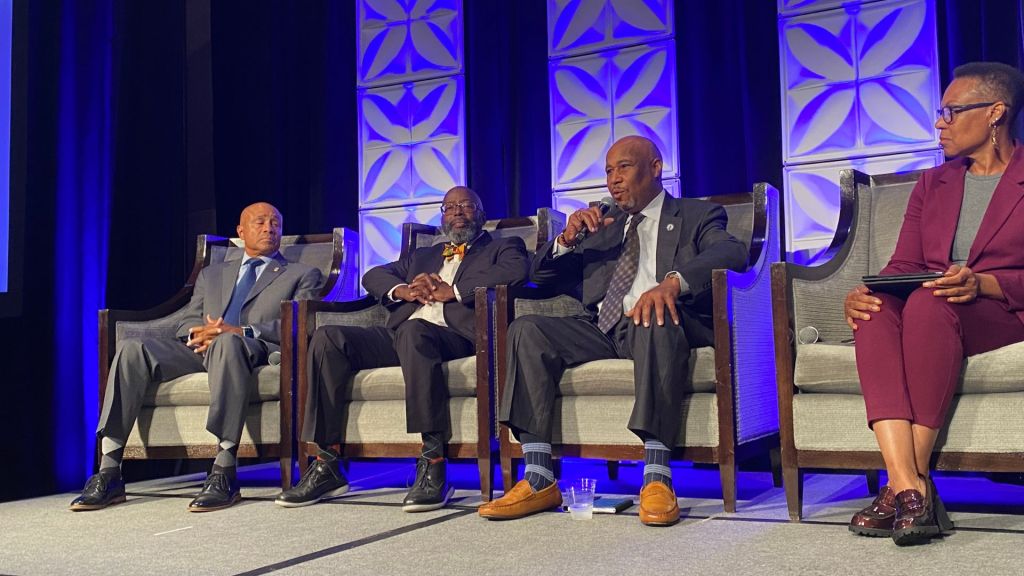By Tashi McQueen and Madeline Seck
AFRO Political Writer and AFRO Intern
At the 2024 National Newspaper Publishers Association (NNPA) Convention in Baltimore on June 21, panelists discussed the importance of racial impact studies in public policy making, especially in an election season.

Panelists included Major Neill Franklin (Ret.), treasurer of the Law Enforcement Action Partnership; Captain Sonia Y. W. Pruitt (Ret.) of the Montgomery County Police Department in Maryland; Jiles H. Ship, president of the National Organization of Black Law Enforcement Executives New Jersey; and Special Agent Trevor Velinor (Ret.), police commissioner of the US Virgin Islands Police Department.
A racial impact study is a technique that the government can apply to look at how a policy or budgetary measure would affect different racial groups.
“I work very closely with the New Jersey Legislative Black Caucus and a number of other state legislators in the state of New Jersey. I will tell you, when the legislation is made and we’re not at that table, we’re probably on the menu. You need to be at that table,” said Ship. “One of the things we were able to do in New Jersey, any legislation that’s dealing with public safety that comes up, before any reports are signed by the governor, they have to have a racial impact study.”
On Jan. 21, 2021, President Biden issued Executive Order 13985: Advancing Racial Equity and Support for Underserved Communities Through the Federal Government. This order reinforced preventable measures to ensure laws created have equal opportunities and equity for all.
“Whoever is elected into office decides on what policy is going to be impacting you and your daily lives,” said Jiles, pushing the importance of getting out to vote. “Decisions being made right now on the U.S. Supreme Court going to impact everyone in this room’s daily lives.”
State Sen. Jill P. Carter (D-Md.-41) was also in attendance and spoke to the AFRO afterward about the use of racial equity impact studies in Maryland and how effective they are for inclusive lawmaking.
Since 2021, the Maryland General Assembly has enacted a requirement for racial equity impact notes to reduce racial discrimination and inequities on significant criminal justice bills making their way through the Legislature.
“It happened around the time the whole country seemingly woke up about the racial disparities in this country, it happened around the time of George Floyd,” said Carter. “Senators and the Senate president got together and we all discussed what are some of the ways that we can make this place more balanced racially. One of the suggestions was to have a racial impact note on every piece of legislation.”
Carter elaborated on how racial equity impact notes have supported her legislative efforts.
“There’s a lot of times, of course, when many people want to contend that issues don’t have a racial impact and that it’s only imagined by some Black people that it has a disparate impact on the Black community,” said Carter. “This helps us legitimize our arguments and helps us use data to show what percentage of Black people are impacted by a certain piece of legislation.
“I think every single legislature should have a racial impact study and note on every piece of major legislation,” continued Carter.
Though moves are being made in state and local legislatures to consider how policies will impact the Black community if enacted, Jiles encouraged African Americans to do their part to ensure Black people have a say in public policy.
“People come to us all the time complaining about policies that law enforcement have, agencies have in place. The first question I asked them was when was the last time you were at a council meeting when they were deciding what that policy was going to be?” said Jiles. “Do you know who your state representative is?”
He also encouraged the Black Press to help reach African Americans with the truth about policy-making, especially about policies that will directly impact the Black community.
The post Experts discuss importance of racial impact studies in public policy appeared first on AFRO American Newspapers.










